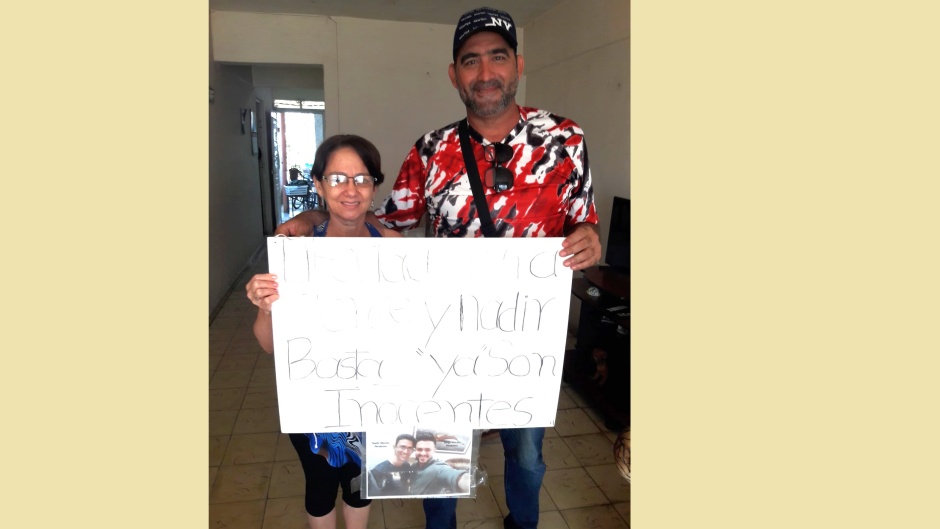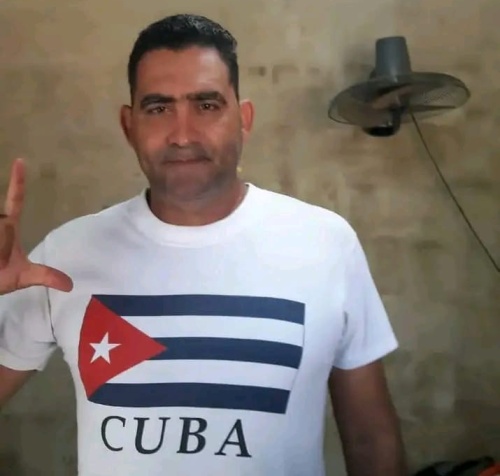Cuba: “If I don’t fight for my country, what world am I going to save?”
An interview with Luis Rodríguez Pérez, who follows the fate of political prisoners in Cuba, two years after the pro-democracy protests. “A vast majority of Cubans have been in the opposition since they have the faculty to reason”.
13 JULY 2023 · 16:09 CET

The chronicles of Luis Rodríguez Pérez are not published by any independent or foreign media, but they have as much reading public as any regular column. Social networks welcome this kind of newspaper that overlaps what happens in the streets of Cuba with the fate of two political prisoners: his wife, Angélica Garrido, and the poet María Cristina Garrido, of whom he is a brother-in-law.
“I am against this government and this murderous system. And not because of that, I am an annexationist; nor does my position mean that I love Japan, Thailand or the United States. Cuba belongs to the Cubans,” he wrote on his Facebook wall in May 2023. His chronicle ended with applause for nationalism, contrary to rampant globalism: “If I don’t fight for my homeland, what world am I going to save?”
Luis’s texts carry the simplicity that the elites hate, the smell of freshly drizzled earth so far from the corridors of power. And not only have they kept the world abreast of what is happening with the Garrido sisters, imprisoned for their participation in the 9/11 demonstrations in their town, Quivicán, but they have also reached out to political leaders such as Ana Belén Cordero.
“Angelica Garrido was arrested in Cuba for participating in the protests on 7 July 2021”, the South American assemblywoman published on her social networks. “Her husband Luis Rodríguez asked me to sponsor her, I do it with deep responsibility and I promise to keep Angélica’s story alive. She is part of the 137 political prisoners in Cuba, who have been made invisible for almost 2 years”.

Angélica and María Cristina Garrido were sentenced to three and seven years in prison, respectively, for the alleged crimes of assault, public disorder and disobedience. Luis writes about each visit, he writes about the children that both women left out of jail, their cries due to the absence of their mother, their academic declines at school due to the separation, “they are like zombies”.
Faith as more than a refuge
Between his captivating and self-taught writing, his efforts to get food for the inmates and keep the family going, Luis finds refuge in his Christian faith. The same one that he maintains and that the Garrido sisters mention in his communications and letters abroad.
“The churches are divided by territoriality, like the one in Ephesus, the one in Galacia, etc., and ours is the Church of Quivicán, because it is located there”, says Luis, who attends a temple not registered by the regime in the Registry of Associations. The non-denominational or denominational congregation believes that the body of God is one, and the head of the Church is Christ.

Luis Rodríguez Pérez. Question. Do you think there are connections between your faith and your work for the freedom of Cuba?
Answer. The Lord, when creating us, put Eternal Life in our hearts; Also, Freedom. It is true that real freedom is what He, with his death and resurrection, with his precious and effective blood, granted us over sin and its consequence, Spiritual death. Everything else is shadow, an image of this wonderful and it would be reality. My fight, for the freedom of my wife and my country, my fight for my own freedom within my country, is the consequence of being born a slave and trying not to continue in this condition. God already dictated his sentence on this government and this profoundly satanic system.
Q. How and when did you come to your Christian faith?
A. I got to know the Lord, or rather, He made himself known, as a 23-year-old young man. As usually happens, the Lord arrives when one has no other solution. I was in Compulsory Military Service, my daughter was born, the country was in the middle of the Special Period, that is, they were objective circumstances that bowed my soul; but, a deep and inexplicable spiritual thirst filled me.
Jesus came, and raised me from the dead. And not, that the material problems were solved, but, that I understood, I understood the nature of things and the Lord faced them for me; mine was, to have joy.
Q. What was your experience on the uprisings on July 11th (11J)?
A. A friend called me: “Did you see what is happening in San Antonio de los Baños?” and hung up.
We searched the networks, and the popular uprising had already spread to various regions of the country. We ran to the house of María Cristina (who was the reference). When we arrived, she was leaving to meet with a group that was already demonstrating several blocks from her house and had called her. It wasn't María Cristina Garrido who started the protest in my town, it was the town itself!
There was never a coup, nor a lack of respect between both parties. The fact that the repressive forces never showed up also helped considerably to the calm of the demonstration.
I still remember that day, I will never be able to forget it! It seemed like a carnival, a party that. People singing, shouting slogans; people were happy, they made jokes, they hugged each other, they cried with emotion. It has been the only time in my life that I have known Freedom.
Q. Where does the Republican Party of Cuba come from, where you are a member?
A. This party was founded in the city of Hialeah in Miami Dade County in Florida, United States, on September 1, 2003, with a 15-member board of directors. Yes, I can affirm that it was created with a deep democratic spirit and with the aim of helping to eliminate the communist dictatorship that governs Cuba, and giving way to a provisional government that allows the creation of a democratic system where there is a rule of law. After it was created, people from exile began to join and, clandestinely, within the island.
Q. What are the main postulates?
A. It was known that the creation of a party that responds to the interests and current realities of our homeland and people, in conditions of exile, was difficult, and even more so with the characteristics of the absurd dictatorial regime that overwhelms the people of Cuba with its machinery. repressive, and with international indifference, except in isolated cases.
Who, in their right mind, could deny that they have turned Cuba into a gigantic prison, daily violating the Universal Declaration of Human Rights, imprisoning and physically eliminating brave patriots? The list of abuses in the long odyssey of Castroism that, due to its duration, has covered different generations, is infinite, and it is really impossible to make a party where all the ideas, interests and needs of Cubans fit.
Q. Since when and how did you join the opposition?
A. Being strictly honest, I believe that the vast majority of Cubans have been in the opposition since they have the faculty to reason. You just go out into the street, and the discontent for this regime and this system is openly general.
Now, to get to the Opposition, that is, to go beyond the daily lament; that expression much more open to the closed circle and not so dangerous that are the queues, the bus aisles and your colleagues in your workplace; taking an attitude consistent with your way of thinking; assuming the immense risk that goes beyond your thinking and translating it into your daily life, that happened almost immediately after July 11, 2021.
My sister-in-law, María Cristina Garrido, belonged to the Republican Party of Cuba. She was her, the only visible, open, consistent opponent in my small municipality. In fact, she is now considered a hero in my town, because before 9/11, she was seen as crazy. It is so.
There is so much fear, there is so much blackmail to which Cubans are subjected (because since salaries are not enough for even a tiny part of the basics, people always walk on what is illegal; the Tyranny knows this, and the people; opposing them is a certain sentence to death by starvation) for this reason, that popular perception of María Cristina's suicidal soul.
I repeat: the crazy woman of the town, she is a hero today. 9/11 came, we all saw the brutal repression, the threats, the torture and the invented causes to criminally prosecute those who were chosen, from every corner of the revolt, to give a lesson. And, in my particular case, when I touched myself personally, seeing the enormous injustice committed against my wife and sister-in-law, I began to speak out solely for them.
Then, one matures, checks the causes and finds that the freedom of the girls is closely related to the freedom of the Homeland. And, it already hurts what happens to all Cubans. It is a just anger for those who trample on the Homeland. It is, shame. It is, Dignity.
Yoe Suárez, Cuban journalist. The author wants to thank Ashland University, for the support in the writing process of this article.
Published in: Evangelical Focus - Features - Cuba: “If I don’t fight for my country, what world am I going to save?”
